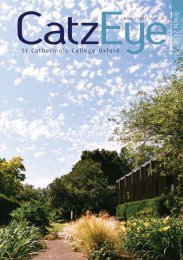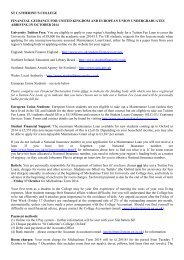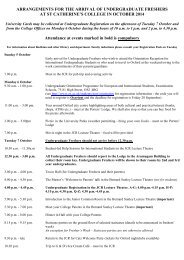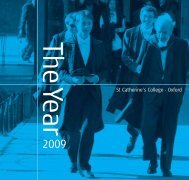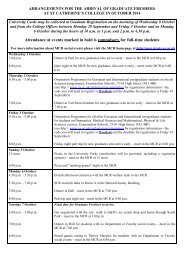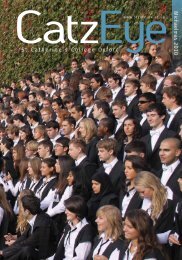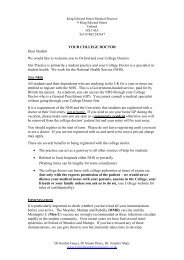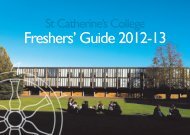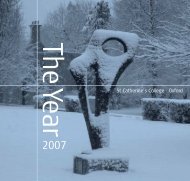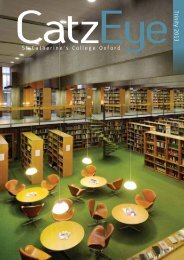CATZ FELLOWSWhat have been the highlights of your careerso far?In 2004, I was the leader of a group that analysed themost sensitive image of the universe to date. Using theHubble Ultra Deep Field (a small patch of sky imagedrepeatedly by the Hubble Space Telescope for 400orbits) we discovered fifty galaxies within a billion yearsof the Big Bang – the faintest and among the mostdistant discovered so far. These discoveries, which werethe culmination of many years of work, receivedinternational recognition and generated a significantamount of academic discussion.What next?Working with NASA, I am involved in the building ofHubble’s successor – the James Webb Space Telescope –which will push our knowledge of galaxies even furtherback in time, potentially seeing the first generations ofstars form in the universe. It is an incredibly excitingtime, and I consider myself to be extraordinarily lucky to bedoing what I have always wanted to do. The telescope isdue to be ready in 2014 and I hope to be one of the firstto use it to discover new things about our universe.Hazy sunset at the summit of MaunaKea, Hawaii... there wasplenty of livelyinterchangebetweenEngland andSpain, throughdiplomats,spies,merchants andtravellers ...Photograph © WM Keck ObservatoryColin ThompsonTutor in Spanish, on theSpanish Golden AgeFor most of the sixteenth and seventeenth centuries –known popularly as the Golden Age – Spain was thedominant European power and, with its Americanpossessions, ruled the largest empire the world had everknown. Despite frequent wars, economic crises and theheavy hand of the Inquisition, its culture was vibrant and itproduced writers, artists and musicians of great originalityand distinction. Yet with one or two exceptions (notablyCervantes and Velázquez) their works are little known in theEnglish-speaking world and scarcely figure in modernhistories of European Renaissance and Baroque culture,which tend to focus on Italy, France and England. That wasnot so at the time: there was plenty of lively interchangebetween England and Spain, through diplomats, spies,merchants and travellers, which partly explains theextraordinary wealth of original editions of Golden-Ageworks in the Bodleian Library, a magnificent scholarlyresource for those who work in this area. The change isprobably due to the political and economic decline of Spainfrom the middle of the seventeenth century and, in morerecent times, to the long shadow cast by the SpanishCivil War.As I look back over my research and plan its future,I can see how it has been influenced by my wish tobring the Spanish Golden Age back into the Europeanmainstream of the time. My last book, on the sixteenthcenturySpanish poet and mystic <strong>St</strong> John of the Cross, was48/COLIN THOMPSON
CATZ FELLOWSpublished in the USA and Britain and in a Spanishtranslation in 2002. Rather to my surprise the Englishedition has recently gone into paperback. I would like tothink that film rights will follow shortly, so that I can fundthe extravagant lifestyle in retirement which I have nothitherto enjoyed. But I am not counting on it. <strong>St</strong> John andhis older contemporary <strong>St</strong> Teresa of Ávila are regarded asthe most important writers of the Western mysticaltradition. You may be surprised to learn that there is such athing, or be tempted to dismiss mysticism as some form ofhigher nonsense. But it is impossible to deny the intenselyrical beauty of <strong>St</strong> John’s poetry, the painful yet creativeanalysis of the self in his treatises, or the presence of hisvoice in many writers across boundaries of language andtime – T S Eliot and Seamus Heaney, to name just two.By the time I had finished the book my attention hadalready turned elsewhere, towards the artistic traditionsof Golden-Age Spain, in part out of a sense of frustrationthat I was not really understanding the paintings I feltduty-bound to admire. Research often starts like that.But there was also a more positive cause. I had beendeeply impressed by the Spanish still-life exhibition atthe National Gallery in 1995, and especially by theextraordinary paintings by the Carthusian Juan SánchezCotán, of cabbages, melons, gourds and other fruit andvegetables strung in a parabola against a dark background.The elevation of humble objects into these mysterious andwonderful things reminded me of passages in the worksof Luis de Góngora, perhaps the most difficult of allthe Golden-Age poets. I began to read, and, as always,what appeared at first to be a nicely defined topic openedso many doors that my initial plans proved hopelesslyunrealistic. That also happens with research. I did, however,put together a Master’s course on literature and painting inBut it isimpossibleto deny theintense lyricalbeauty of<strong>St</strong> John’spoetry ...the Golden Age, which has attracted a number of graduatestudents, one of whom has recently gained his doctorateand two more of whom are close to submission. I havefound this very rewarding. Two periods of sabbatical leavehave enabled me to do more sustained reading and tobegin writing. The book I am planning, significant parts ofwhich are already in draft, will cover a number of areas inwhich the interplay between the visual and the verbalenriches our understanding of the period: poems whichdescribe real or imagined works of art; paintings whichrequire knowledge of written sources to decode them;painters who wrote treatises on their art; paintings in whichbooks or manuscripts play a significant part; the sharedanalytical and critical language of literature and painting;attitudes to difference (by which I principally mean thereception of non-Spanish artists, notably Hieronymus Boschand El Greco). Do not ask me – yet – how it will all fittogether. The laborious process of writing the first draftsis the only way, in my experience, in which the broaderthemes and the overall focus can emerge from the detail.The demands of teaching, examining and administrationmean that research time gets severely squeezed, even inthe Long Vacation. So do not ask me, either, when I expectto finish. I firmly believe that a book is likely to be betterfor being cooked long and slow.When not engaged in teaching and research, Colincontinues to serve as a minister of the United ReformedChurch in what he describes as a ‘non-stipendiary andvery spare-time capacity’ in Wheatley, just outside Oxford.Having completed a four-year stint as Senior Tutor in 2007,he has since been elected by Congregation to serve on theUniversity’s Council for four years, with a clear commitmentto maintain and enhance the participatory democracy whichcharacterises Oxford’s governance.ST CATHERINE’S COLLEGE 2008/49
- Page 1 and 2: The Year2008St Catherine’s Colleg
- Page 3 and 4: CONTENTSContentsMaster’s Report 2
- Page 5 and 6: MESSAGESThe public profile of Colle
- Page 7 and 8: MESSAGESplacing Oxford in the posit
- Page 9 and 10: COLLEGE LIFEDeanthings. Students do
- Page 11 and 12: COLLEGE LIFEST CATHERINE’S COLLEG
- Page 13 and 14: COLLEGE LIFESpaceywatching his exam
- Page 15 and 16: COLLEGE LIFEJames Bennett, the Home
- Page 17 and 18: COLLEGE LIFEbusiness - which turns
- Page 19 and 20: COLLEGE LIFECatz fivezero, 1962-201
- Page 21 and 22: COLLEGE LIFEJoshua Silver (1964, Ph
- Page 23 and 24: COLLEGE LIFEPhilosophy, Politics &E
- Page 25 and 26: COLLEGE LIFEGraduate Degrees & Dipl
- Page 27 and 28: COLLEGE LIFESports ReviewIn rowing,
- Page 29 and 30: STUDENT PERSPECTIVESDaniel Gallaghe
- Page 31 and 32: STUDENT PERSPECTIVESLogan Gerrity(2
- Page 33 and 34: STUDENT PERSPECTIVESLucy Rowland(20
- Page 35 and 36: STUDENT PERSPECTIVESnuts. Three day
- Page 37 and 38: ALUMNI NEWSintegral metal plaque in
- Page 39 and 40: ALUMNI NEWSMichelle Teasel (1988, M
- Page 41 and 42: ALUMNI NEWSDavid Baum (1982, Botany
- Page 43 and 44: ALUMNI NEWSJack Douay (1946, Agricu
- Page 45 and 46: ALUMNI NEWSNews in briefSophie Chil
- Page 47 and 48: ALUMNI NEWSThe College time capsule
- Page 49: CATZ FELLOWSthe idea that we can le
- Page 53 and 54: CATZ FELLOWSThat research currently
- Page 55 and 56: CATZ FELLOWSOckendonof Mathematicse
- Page 57 and 58: CATZ FELLOWSDan HoweEmeritus Profes
- Page 59 and 60: CATZ FELLOWSMichael and Khoan retur
- Page 61 and 62: GAZETTEninety-four, he and Margery
- Page 63 and 64: GAZETTELondon to study Law, and I p
- Page 65 and 66: GAZETTEupgrading this remarkable sy
- Page 67 and 68: GAZETTERobin McCleery(1976, Physiol
- Page 69 and 70: GAZETTEClive Barnes(1948, English)F
- Page 71 and 72: GAZETTEMARCEL PAUL NOËL (1939, Mat
- Page 73 and 74: GAZETTEMathematicsJames Baker - Sir
- Page 75 and 76: Master and Fellows 2008Kirsten E Sh



